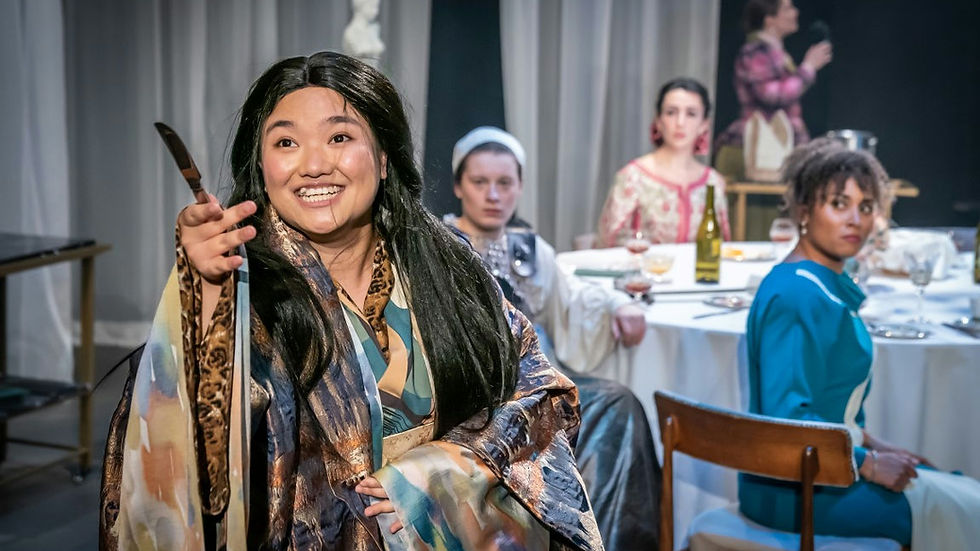Top Girls
- Jenny Daniel

- Mar 11, 2023
- 3 min read
Caryl Churchill
Liverpool Everyman and Playhouse
Liverpool Everyman
March 3-25, 2023; 2hrs 30mins


It’s Thatcher’s Britain, and the girls are on top. Well, some of them are. But it’s never quite that simple is it?
We meet our hostess, the young, upwardly-mobile Marlene, at a posh London restaurant, celebrating her promotion, eating and drinking raucously with girlfriends.
But these friends are a disparate bunch – characters from history and art who have suffered for various permutations of female power.
There is Pope Joan, the fraudulent female "pontiff" who was stoned after the revelation that she had borne a child; 19th-century explorer Isabella Bird who prioritised adventure and was disappointed in marriage; Japanese concubine Lady Nijo, whose proud success was in service and slavery to powerful men; warrior Dull Gret, whose painted image fought hell’s devils, and Griselda, whose celebrated patience facilitated her husband’s need to test her -including the removal of her children.
What proto-feminist empowerment they embody; what sacrifice, exploitation and abuse they endured.
Throughout the first act these women converse, cutting across and talking over one another as people at dinner do, though seldom in the context of a play. Parallels are drawn between their experiences; poignantly individual traumas are made known. The acting is difficult, but splendid, with particular mention of Elizabeth Twells as emergency cover, stepping into the role of Isabella Bird and other characters.
Act 2 brings us from surrealism to the realism of Liverpool in 1981-82, the play's location moved to the city by Churchill and the Everyman team for this 40th anniversary production.
Two children are seen playing - explicitly diverse for 1980s Liverpool, they represent the South East Asian and the Black communities of L8 in particular. The socialist and feminist struggles that Caryl Chruchill wrote for the original are now intersected with the history of racial tensions here at that time.
Such struggles are never simple and there is no reductivism here. Angie, rather simple and young for her years, wears a party dress and wants to kill her mother and go and find her aunt. Marlene is Angie’s aunt (or is she?) who, in the second scene of Act 2, newly promoted, is swanning around the Top Girls employment agency with caricatured lady colleagues in power suits.
They deal with clients and find work for women, dissecting their lives, their attributes, and their chances in a man’s world, with little sympathy. Angie’s arrival is met with confusion but goodwill, as it is slowly revealed that Marlene is her natural mother, who gave her up for the cut and thrust of this dream career. Tala Gouveia embodies Marlene brilliantly, with an ambiguous, uncomfortable, distant affection for the child she didn't allow to stand in her way. There are brilliant moments, in which the tensions of women’s lives are revealed at odds with one another.
Twells, now as the wife of a disgruntled colleague of Marlene, reveals her desperation and resentment at his losing out to a fenale boss, and the life of subservience she has "chosen" to fulfil her husband’s ambition, now thwarted by a new kind of woman.
Act 3 rewinds time to Marlene’s visit home to Liverpool a year previously, to her sister Joyce and to Angie, and meaningfully consolidates the tension of career girl versus mother.
The politics of the 80s are made explicit. As Marlene shouts for Thatcher and the new capitalism, Joyce, at home in the midst of the Toxteth riots and the managed decline of Liverpool, is disgusted.
What, in Marlene’s world, is to become of Angie, whose weaknesses will exclude her from the go-getter lifestyle of Tory ideology? Tala Gouveia embodies Marlene with an 80s swagger and the rest of the cast bring unique gifts to the characters they present.
The move to early-Eighties Liverpool is inspired, and congratulations must go to the Everyman whose ambition to "inspire, entertain and nurture positive social change" is met in this socialist vehicle, that questions the diverse ambitions of feminism and the position of women through time.
Everything changes, yet everything stays the same. Top Girls is as relevant today as it was in 1982. In a world where women are told they can have it all, the reality is here thoughtfully but brutally and relentlessly presented.
What then, we must ask ourselves, are women to do?
More info and tickets here










